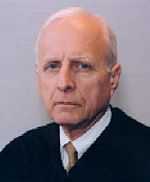Edward Roy Becker
| Edward Roy Becker | |
|---|---|
 | |
| Chief Judge of United States Court of Appeals for the Third Circuit | |
| In office 1998–2003 | |
| Preceded by | Dolores Sloviter |
| Succeeded by | Anthony Joseph Scirica |
| Judge of United States Court of Appeals for the Third Circuit | |
| In office 1981–2003 | |
| Nominated by | Ronald Reagan |
| Preceded by | Max Rosenn |
| Succeeded by | Franklin Stuart Van Antwerpen |
| Personal details | |
| Born | May 4, 1933 Philadelphia, PA |
| Died | May 19, 2006 (aged 73) Philadelphia, PA |
Edward Roy Becker (May 4, 1933 – May 19, 2006) was a United States federal judge on the Court of Appeals for the Third Circuit.
Born in Philadelphia, Pennsylvania, Becker received his B.A. from the University of Pennsylvania in 1954, and his LL.B. from Yale Law School in 1957. He had a private law practice in Philadelphia from 1957 to 1970.
Judicial appointments
Becker's career as a federal judge began with his nomination to the U.S. District Court for the Eastern District of Pennsylvania. He was nominated by President Richard M. Nixon on September 24, 1970 to a new seat created by 84 Stat. 294, was confirmed by the United States Senate on October 8, 1970 and received his commission on October 14, 1970. His service terminated on January 22, 1982 due to his elevation to the Third Circuit.
Ronald Reagan nominated Becker on November 16, 1981 to the Third Circuit seat vacated by Max Rosenn. Becker was confirmed by the Senate on December 3, 1981 and received his commission on the same day. He served as Chief Judge from 1998 to 2003.[1] He assumed senior status on May 4, 2003.
Judicial style and cases
Becker was known for the case Mackensworth v. American Trading Transportation Co. a decision that he wrote in verse.[2] He was also known for occasionally inserting humor into judicial rulings.[3]
In 2003, Becker authored the decision on Freethought Society of Greater Philadelphia v. Chester County, ruling that the display of Ten Commandments outside of a courthouse of Chester County did not violate the Establishment Clause of the First Amendment.[4]
Becker was known for his humility and humanity; clerks were told to come up with strong arguments against his positions and not merely defer to him. He commuted by train for nearly his entire career, often reading cases along the way. His law clerks accompanied him during afternoon walks to visit his elderly mother in center city, discussing cases along the way and back. He was active in civic affairs, including some involvement in the relocation of the Liberty Bell.
Family and personal life
Becker spent virtually all of his life in and around the city of Philadelphia. His family has a strong legal tradition; his father was a lawyer, his wife Flora was also a judge, and two of their three children are also lawyers; son John became a teacher, while son Charles "Chip" Becker is a lawyer in private practice and daughter Susan has worked for the Philadelphia District Attorney's office. His parents, wife, and friends generally called him Eddie. He was a fan of the Sixers basketball team.
He was an expert piano player; a former law clerk of his recruited him to become the pianist for Chief Justice Rehnquist's annual all-court sing-along.[5]
Legacy
Funeral
Becker died May 19, 2006.[6] He was both popular and well-connected; the receiving line at his funeral stretched through the synagogue and overflowed into the parking lot, and could not be completed in the two hours time allotted. Eulogies were delivered by Senator Arlen Specter, Third Circuit Court colleagues Chief Judge Anthony Scirica, Judge (and future Supreme Court Justice) Samuel Alito, and Judge Midge Rendell, and by Stephen Harmelin, managing director of Dilworth Paxson. U.S. Supreme Court Justices Antonin Scalia and David Souter, as well as Pennyslvania Governor Edward G. Rendell attended the ceremony.[7]
Citizenship Award
After his death, the Community College of Philadelphia created the Judge Edward R. Becker Citizenship Award.[8] Recipients have included:
- 2007: Senator Arlen Spector, a friend of Judge Becker's from law school days
- 2008: William T. Coleman, Jr., civil rights attorney and former U.S. Transportation Secretary
- 2009: Sister Mary Scullion,[9] advocate for the homeless
- 2010: Marjorie O. Rendell, First Lady of Pennsylvania, federal judge and former colleague of Becker's.[10]
- 2011: Edward G. Rendell, former Governor of Pennsylvania.[11] The award ceremony was delayed due to inclement weather.
- 2012: Senator Robert P. Casey, Jr. was supposed to receive the award, but the ceremony was cancelled because it was feared that it would be a focus for polictical demonstrations relating to an ongoing labor dispute at the college.[12]
The award is generally presented by Judge Becker's son, Chip, in the early part of the year, February through April.
Law Clerks
Among his law clerks were:
- future law professor Zephyr Teachout, best known for her work as director of online organizing for the campaign of Howard Dean for the 2004 Democratic Presidential nomination.[13]
- future law professor Marci A. Hamilton, holder of the Paul R. Verkuil Chair in Public Law at Benjamin N. Cardozo School of Law, Yeshiva University
References
- ↑
- ↑ Laughed out of court - humour from the Bench, Times Online.
- ↑ Say What?! - A weblog of classic humor from U.S. District Judge Jerry Buchmeyer
- ↑ 3rd Circuit: Ten Commandments plaque can remain on courthouse The Associated Press
- ↑ http://writ.news.findlaw.com/hamilton/20060601.html
- ↑ .
- ↑ http://writ.news.findlaw.com/hamilton/20060601.html
- ↑ http://www.ccp.edu/site/news_room/pathways_magazine/pathways_summer08/law_society.html
- ↑ http://www.ccp.edu/site/news_room/transcripts/0609/scullion.html
- ↑ http://www.ccp.edu/site/news_room/transcripts/0610/college_snapshots.php
- ↑ http://www.ccp.edu/site/news_room/press_releases/2011/042711.php
- ↑ http://studentvanguard.com/2012/03/04/award-to-senator-casey-event-cancelled/
- ↑ http://law.fordham.edu/faculty/zephyrteachout.htm
External links
- Edward Roy Becker at the Biographical Directory of Federal Judges, a public domain publication of the Federal Judicial Center.
|